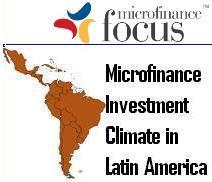Downturn has not reduced investor interest in Latin America: Beth Castleberry, Global Partnerships
- Saturday, January 16, 2010, 21:22
- Latest News
- Add a comment
By Matthew Fuchs
Jan. 16, 2010: With its mature and dynamic microfinance sector, Latin America is one of the world’s largest microfinance investment markets. As a result, the region’s response to the financial crisis has profound implications for microfinance investment globally. To gauge the current state of the investment climate in Latin America, Microfinance Focus has conducted a survey of fund managers.
In our final report on the survey, Beth Castleberry, Chief Development Officer at Global Partnerships, argues that Latin America has remained resilient despite the downturn. Global Partnerships focuses exclusively on Latin America, and has invested in the region since 1994. Global Partnerships is based in Seattle, US, and has a regional office in Managua, Nicaragua.
Microfinance Focus: Has funder appetite for the region been affected by the downturn?
Beth Castleberry: The downturn has not impacted investor interest and/or participation in Global Partnerships microfinance funds. GP closed a $20 Million Fund in November 2008 and is tracking to close a similar sized fund in the first half of 2010.
Microfinance Focus: How has the downturn affected MFI demand for funds? Is there a funding shortage or is excessive liquidity an issue?
Beth Castleberry: Generally, there are fewer sources of capital available to MFIs and thus we are seeing a greater demand for funds like those offered by Global Partnerships.
Microfinance Focus: A recent Fitch report argues that the impact of the downturn cannot be generalised across regions but varies from country-to-country. Which countries have fared better or worse then others? Why?
Beth Castleberry: Global Partnerships has microfinance partners in seven countries throughout Latin America. The MFIs operating in the Andean countries – Ecuador, Bolivia and Peru have fared better. Those operating in the Central American countries have fared less well, in particular the MFIs in Nicaragua which struggled with a non-payers movement following the 2006 elections.
Microfinance Focus: Multilateral agencies and DFIs have stepped-up their investment activity over the last year, for example the IFC’s Microfinance Enhancement Facility, OPIC’s new fund for Latin America. Do investors face increased “competition” from multilateral agencies?
Beth Castleberry: Global Partnerships invests in social enterprise or mission-driven MFIs and thus we have not felt crowded out by DFI activity as the majority of multilateral agencies invest in commercial microfinance institutions.
Microfinance Focus: The agitation for regulatory change in Nicaragua has been well-publicized. Are there any other moves toward regulatory change in the region? If so, what effect could this have on investment in the region?
Beth Castleberry: Latin American countries are creating regulations for microfinance institutions which will allow MFIs to be a on a more level playing field with other financial institutions (i.e. ability to accept savings). Generally, Global Partnerships views these regulations as reasonable and believes it could attract more investment in microfinance throughout the region.
© 2010, Microfinance News. All rights reserved. 2008-09
Write a Comment
Gravatars are small images that can show your personality. You can get your gravatar for free today!










